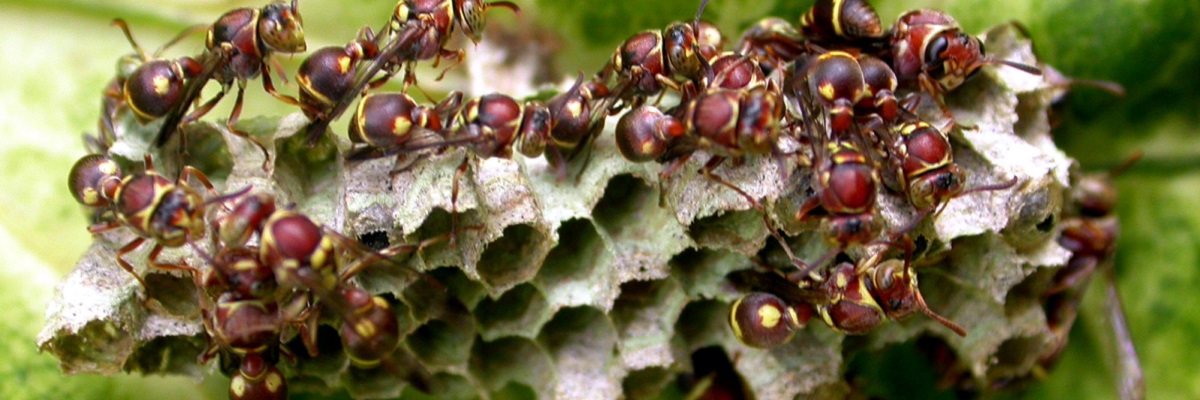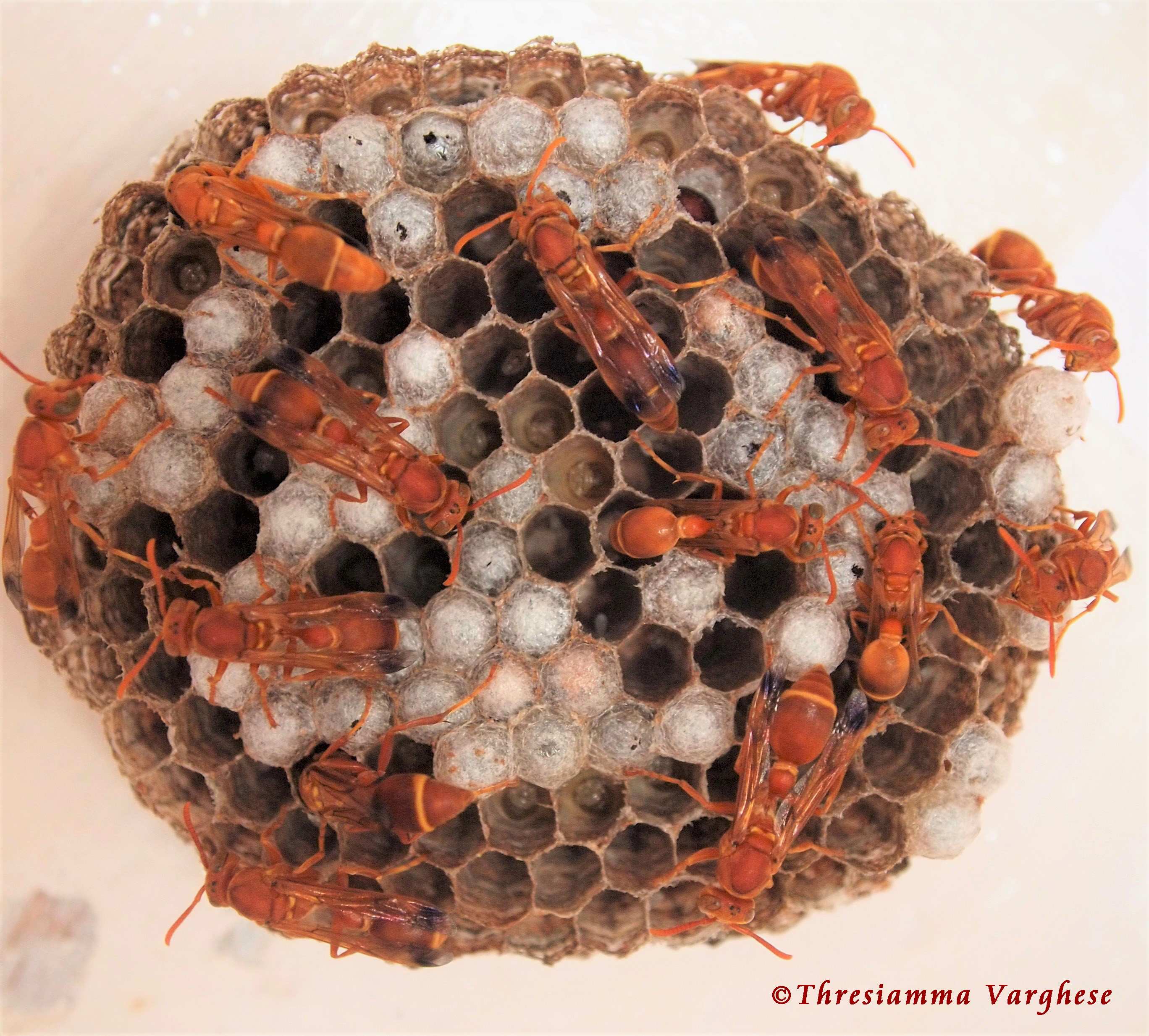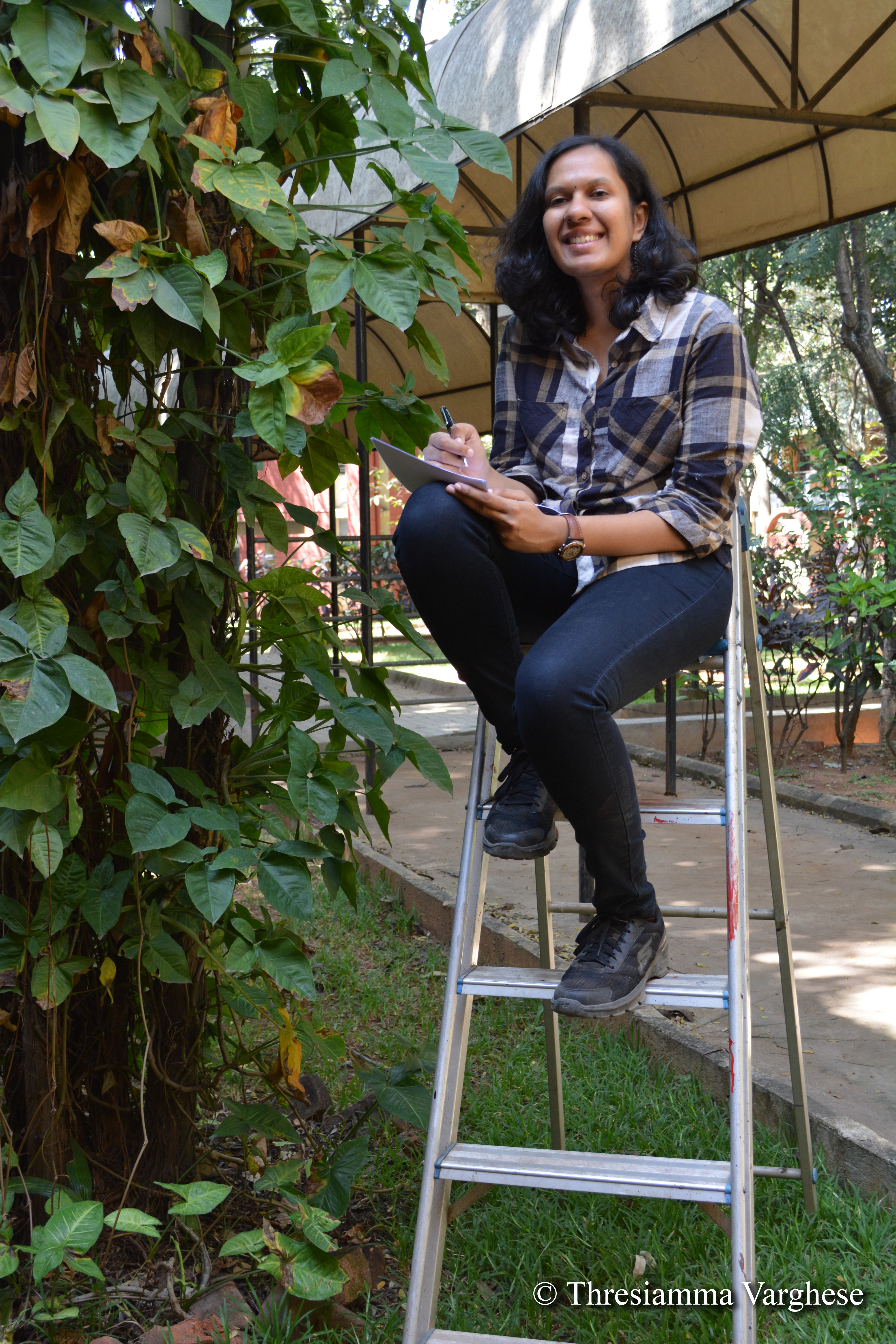Succession Without Conflict in Insect Societies
 Prof. Raghavendra Gadagkar’s research group at IISc has been investigating the primitively eusocial Indian paper wasp Ropalidia marginata for some time now. Our studies have revealed that this is a rather unusual species. As expected, colonies consist of a single fertile queen and several sterile workers but, rather unexpectedly, the queen is a strikingly meek and docile individual that appears not to use physical aggression either to suppress reproduction by her workers or to make them work. Instead, she appears to use pheromones to maintain her reproductive monopoly, and the workers appear to regulate their non-reproductive work through decentralised self-organisation – a bottom-up rather than a top-down control. Queens are periodically replaced by workers who become new queens. as expected, but such succession is a remarkably peaceful and conflict-free process.
Prof. Raghavendra Gadagkar’s research group at IISc has been investigating the primitively eusocial Indian paper wasp Ropalidia marginata for some time now. Our studies have revealed that this is a rather unusual species. As expected, colonies consist of a single fertile queen and several sterile workers but, rather unexpectedly, the queen is a strikingly meek and docile individual that appears not to use physical aggression either to suppress reproduction by her workers or to make them work. Instead, she appears to use pheromones to maintain her reproductive monopoly, and the workers appear to regulate their non-reproductive work through decentralised self-organisation – a bottom-up rather than a top-down control. Queens are periodically replaced by workers who become new queens. as expected, but such succession is a remarkably peaceful and conflict-free process.

Such peaceful succession is achieved through pre-designated potential queens, in fact a whole queue of them. Because these features are so unexpected, we have turned to the sister species Ropalidia cyathiformis which we suspect may be a more typical primitively eusocial species. A recent painstaking study by Sruthi Unnikrishnan has confirmed that queens of R. cyathiformis are indeed aggressive and often at the top of the dominance hierarchies of their colonies. They are also periodically replaced by their workers, but rather surprisingly, even in this species, queen succession appears to be achieved by a system of preselected potential queens who step into their roles as new queens without ever being challenged by the rest of the workers. Such absence of overt conflict especially during the crucial phenomenon of queen succession is most intriguing. Our working hypothesis is that these tropical wasps, both R. marginata and R. cyathiformis, have been selected to maintain a healthy, conflict-free social organisation to ward off predators and other enemies that may take advantage of a chaotic situation in the colony. Clearly much more interesting work can, and needs to be done.
maintain a healthy, conflict-free social organisation to ward off predators and other enemies that may take advantage of a chaotic situation in the colony. Clearly much more interesting work can, and needs to be done.
References:
Unnikrishnan, S. and Gadagkar, R. (2017). Dominance based reproductive queue in the primitively eusocial wasp, Ropalidia cyathiformis. Insectes Sociaux, 64, 495-503. doi: 10.1007/s00040-017-0568-5
Gadagkar, R. (2018). Choosing a New Queen: Consensus without Conflict in a Social Wasp Colony. In: Landscapes of Collectivity in the Life Sciences. (Eds.) S.B. Gissis, E. Lamm and A. Shavit, The MIT Press, Cambridge, Massachusetts, pp. 67-75.
Centre for Ecological Sciences.
http://ces.iisc.ac.in/hpg/ragh/




 Prof. Raghavendra Gadagkar’s research group at IISc has been investigating the primitively eusocial Indian paper wasp Ropalidia marginata for some time now. Our studies have revealed that this is a rather unusual species. As expected, colonies consist of a single fertile queen and several sterile workers but, rather unexpectedly, the queen is a strikingly meek and docile individual that appears not to use physical aggression either to suppress reproduction by her workers or to make them work. Instead, she appears to use pheromones to maintain her reproductive monopoly, and the workers appear to regulate their non-reproductive work through decentralised self-organisation – a bottom-up rather than a top-down control. Queens are periodically replaced by workers who become new queens. as expected, but such succession is a remarkably peaceful and conflict-free process.
Prof. Raghavendra Gadagkar’s research group at IISc has been investigating the primitively eusocial Indian paper wasp Ropalidia marginata for some time now. Our studies have revealed that this is a rather unusual species. As expected, colonies consist of a single fertile queen and several sterile workers but, rather unexpectedly, the queen is a strikingly meek and docile individual that appears not to use physical aggression either to suppress reproduction by her workers or to make them work. Instead, she appears to use pheromones to maintain her reproductive monopoly, and the workers appear to regulate their non-reproductive work through decentralised self-organisation – a bottom-up rather than a top-down control. Queens are periodically replaced by workers who become new queens. as expected, but such succession is a remarkably peaceful and conflict-free process.
 maintain a healthy, conflict-free social organisation to ward off predators and other enemies that may take advantage of a chaotic situation in the colony. Clearly much more interesting work can, and needs to be done.
maintain a healthy, conflict-free social organisation to ward off predators and other enemies that may take advantage of a chaotic situation in the colony. Clearly much more interesting work can, and needs to be done.